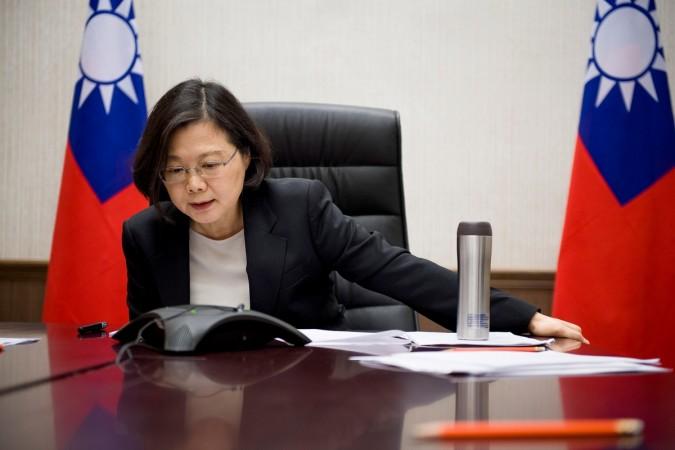
The Chinese navy conducted live fire drills in the Taiwan Strait while the air force held what was termed island encirclement patrols this week. The unusual intensity and breadth of the military drills made regional experts scramble . Many said the drills suggested that the PLA now had a 'comprehensive battle plan for Taiwan'. The South China Morning Post carried a news story titled 'Has Beijing just put the finishing touches to its battle plan to take back Taiwan?
Military drill in Taiwan Strait is no news. However, the sudden scramble points to some key changes in the China-Taiwan calculus. China has never ruled out taking Taiwan by military force, though the term "peaceful unification" got a semblance of respectability in the ebb and flow of diplomacy over the decades. That may be changing.
"The PLA has an unshakeable determination to safeguard national reunification," Communist party mouthpiece Global Times wrote on Friday. It went on to say that whoever infringes upon the one-China policy and advocates Taiwan independence "will invite destruction."
The tone of the Chinese and the nuances of the language they use with reference to Taiwan signify a greater gravitation to the view that it's purely a matter of the mainland choosing a time for the annexation. "It is up to the Chinese people to eventually decide when and how Taiwan will be reunified," the Global Times continues.
When fiery pro-Independence leader Tsai Ing-wen became President of Taiwan in 2016, the relations with the mainland hit a nadir. Beijing was used to pro-unification or neutral regimes in the past. However, Tsai, the first woman to become President, changed the equations, forcing China to say she was trying to tie Taiwan in the US stable.
Tsai recently answered the charge that she's a pawn in the hands of Washington. "This is my answer to them: Do not underestimate Taiwan. With a population of 23 million, Taiwan is not a small country .... Although it's a common saying that we are a pawn at the mercy of others, do not forget we ourselves are also a chess player."
China's answer to that assertion of strength and independence was ominous. "If Taiwan becomes a chess player, it will be told "game over" by the mainland,' the mouthpiece warned after the live fire drills.
Meanwhile, a survey released on Friday showed that the Taiwanese are overwhelmingly ready for a battle with China to protect their independence and democracy. According to the survey conducted by Taiwan Foundation for Democracy, 68 percent of Taiwanese want a war if China tries to forcibly annex the country. About 55 percent support a declaration of independence and then a war to defend it. However, given a choice, as many as 91 percent of Taiwanese like the status quo to continue.
Military and geopolitical analysts have been increasingly becoming unsure about how long the status-quo would continue. In his book The Chinese Invasion Threat, strategist Ian Easton said the United States may have less than ten years to foreclose an out and out Chinese aggression. Many others fear that window is narrowing.
The two Chinas -- The Republic of China (ROC) in Taiwan and the People's Republic of China (PRC) in the mainland have been at odds ever since their separation in 1949 following the Communist revolution led by Mao Zedong and the retreat of the Kuomintang fighters led by Chiang Kai-shek. Now, for the official China, one goal set by founder Mao remains unfulfilled -- a rapid completion of the military takeover of Taiwan.
Multiple Pulitzer prize winner Thomas Friedman offered some insight into the relative calm across the Strait since mid-80s. In his book 'The World is Flat' he argued that the supply chain had superseded geopolitics. That economic priorities and business integration had assumed the power to avert wars. He proposed the so-called 'Dell theory' in which he argued that "no two countries that are part of the same global supply chain will ever fight a war as long as they're each still part of that supply chain."
He went on to say that China and Taiwan are the best examples. "The Taiwanese people basically chose motherboards over motherland," Friedman said on another occasion. At the heyday of the personal computer revolution, a supply chain "that runs along coastal China, through Taiwan, on through Japan, up through Malaysia, parts of the Philippines, parts of Thailand" was a "too crucial to snap" lifeline.
In The World is Flat, he even wondered whether it was the sanctity of that supply chain that had prevented China from annexing Taiwan through a war. Now, more than a decade later, the world has changed. It's arguably less flat that it was in 2005. With Donald Trump in the White House and Xi Jinping grabbing possibly a lifetime of power in China, the world is rather more insular.
While Trump is shrinking the famed American influence abroad, Xi Jinping is expanding his country's reach, influence and power. Trump's 'Make America Great Again' motto is inward-looking; it's is more about pulling out of trade pacts, imposing a trade war and cutting back on global commitments. On the other hand, Xi is actually making China great; he's boosting partnerships, tightening the grip on the seas around and setting up military bases in key places.
That doesn't bode well for Taiwan's independence and democracy.









